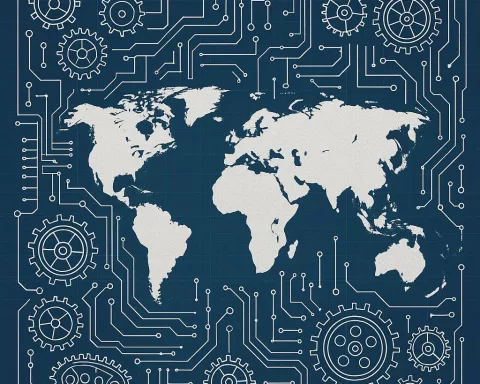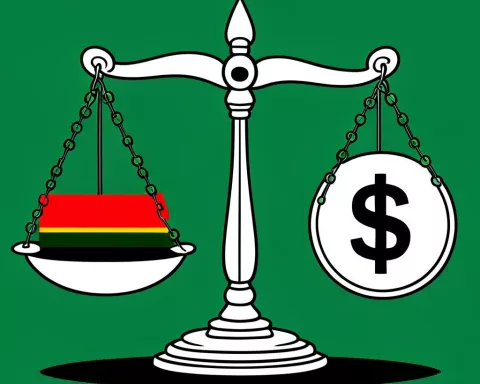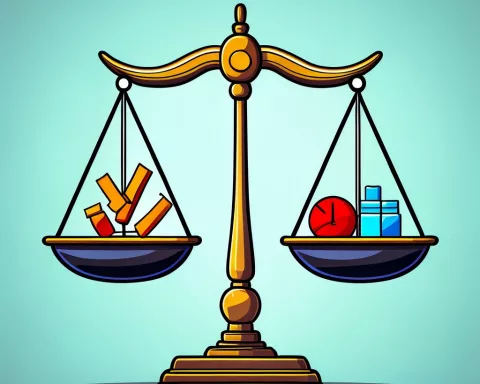South Africa is in a political storm over corruption claims against Khumbudzo Ntshavheni, the Minister in the Presidency. The Democratic Alliance (DA) is pushing for her removal, demanding clear answers and honest leadership from President Cyril Ramaphosa. As an investigation into a huge R80 million scandal unfolds, concerns grow about trust in the government and the safety of sensitive information. With upcoming elections, the pressure is on for leaders to choose between political loyalty and the need for transparency. This situation highlights a long-standing struggle against corruption that continues to challenge the nation’s values.
What is the current political dilemma in South Africa?
The political dilemma in South Africa revolves around allegations of corruption involving Khumbudzo Ntshavheni, the Minister in the Presidency. Urged by the Democratic Alliance, calls for her dismissal highlight a broader demand for accountability and ethical governance amidst ongoing investigations into significant financial misconduct.
The Complex Dynamics of Political Allegiances
The landscape of South African politics often resembles a shifting desert, where alliances are as transient as sand dunes. Recently, the Democratic Alliance (DA) has stirred the political pot, intensifying the debate on governance ethics by urging President Cyril Ramaphosa to dismiss Khumbudzo Ntshavheni, the Minister in the Presidency. This call to action underscores not just a political maneuver but a deeper inquiry into the principles of accountability and ethical governance.
The roots of this controversy stretch back to an investigation led by the Hawks, South Africa’s Directorate for Priority Crime Investigation. Initially focused on a R2 million tender fraud linked to Ntshavheni’s role as a former municipal manager at Ba-Phalaborwa Local Municipality, the inquiry has swelled into an R80 million scandal. This burgeoning investigation not only echoes previous financial scandals but also reinforces the lingering specter of corruption that overshadows the nation’s political history.
Corruption in South Africa is, regrettably, a recurring theme. The misuse of public funds has often transitioned into personal enrichment for a select few, casting a long shadow over governance. This latest scandal risks eclipsing past corruption episodes, serving as a stark reminder that accountability remains an elusive goal within the government. It rekindles memories of state capture, urging the public to remain vigilant against ever-present corruption.
Voices of Criticism and National Security Concerns
Amidst this turbulent scene, Dianne Kohler Barnard, a DA MP and spokesperson on state security, emerges as a formidable critic. Her vocal opposition to Ntshavheni’s continued role in the Cabinet extends beyond financial misconduct allegations. She highlights the dangers of granting a government member under investigation unfettered access to sensitive information, framing it as a grave national security concern.
Kohler Barnard’s apprehensions are rooted in the significant influence wielded by the Minister in the Presidency, a role that serves as a pivotal link between the Cabinet and the President. In a political environment where alliances influence governmental actions, Ntshavheni’s close relationship with Ramaphosa adds layers of complexity. Critics interpret the President’s hesitance to act decisively against her as a strategic move prioritizing political survival over transparent governance.
This unfolding drama occurs within an African National Congress (ANC) government already grappling with waning public trust and internal discord. As the nation approaches its general elections, the pressure on Ramaphosa to adopt a staunch anti-corruption stance intensifies. His administration’s silence on Ntshavheni’s case might be a calculated decision to respect due process, yet for many, it signals an unsettling lack of resolve, further straining public confidence.
The Public’s Demand for Transparency and Integrity
While the Hawks’ investigation remains in progress, Ntshavheni finds herself in an uncertain position. Her silence on the matter may serve as a protective political strategy, but it leaves a public eager for clarity and accountability in the dark. The DA’s relentless push for her removal mirrors a broader societal demand for political leaders who adhere to ethical standards.
The DA’s stance acts as a crucial check on the ruling party’s perceived inaction, embodying a larger narrative within South African politics: the ongoing tug-of-war between retaining political power and upholding ethical governance. Their insistence on accountability is a reminder of their role as a watchdog, striving to keep the ruling party in check.
While specifics of the investigation remain hidden, the broader implications are unmistakable. The allegations extend beyond financial misdeeds to highlight systemic issues deeply ingrained in South African politics. The R80 million in question symbolizes a far-reaching problem that transcends mere figures, representing a pervasive corruption challenge that has persisted for decades.
Reflecting on Governance and the Path Forward
In considering the current scenario, it is impossible to ignore the parallels with historical and artistic themes exploring power and corruption. Much like the baroque era’s elaborate facades that masked underlying moral decay, South Africa’s political scene presents a veneer of stability, concealing complex and often murky dealings beneath.
This scandal places President Ramaphosa at a crossroads, challenging him to navigate the delicate balance between political loyalty and moral duty. As the nation observes each move in this political performance, both supporters and critics scrutinize the unfolding situation with keen interest.
For the broader public, this is more than just another scandal; it represents a critical examination of the country’s democratic values. It raises pressing questions about the future of governance in South Africa—will the leaders opt for transparency and reform, or will they perpetuate a cycle of secrecy and corruption? The outcome of this drama holds the potential to shape the nation’s political trajectory for years to come.
By weaving together the DA’s demands, the Hawks’ investigation, and the broader implications for South Africa’s political landscape, this narrative provides insight into the complex interplay of governance and accountability. As events continue to unfold, this story serves as a poignant reminder of the enduring struggle for integrity within the corridors of power.
“`markdown
FAQ: Unraveling the Political Web in South Africa
What is the current political dilemma in South Africa?
The political dilemma in South Africa centers around corruption allegations against Khumbudzo Ntshavheni, the Minister in the Presidency. The Democratic Alliance (DA) is calling for her dismissal, emphasizing the need for accountability and ethical governance as investigations into a significant R80 million scandal are underway.
Who is Khumbudzo Ntshavheni and what are the allegations against her?
Khumbudzo Ntshavheni is the Minister in the Presidency and has been implicated in a corruption scandal that began with an investigation into a R2 million tender fraud from her time as a municipal manager. This inquiry has expanded into a larger R80 million scandal, raising serious concerns about her integrity and the management of public funds.
What role does the Democratic Alliance (DA) play in this situation?
The DA has taken a proactive stance by urging President Cyril Ramaphosa to remove Khumbudzo Ntshavheni from office. Their actions reflect a broader societal demand for transparency and accountability in governance, acting as a check on the ruling African National Congress (ANC) amid rising corruption concerns.
How does this scandal impact national security?
Dianne Kohler Barnard, a DA MP, has raised alarms about the implications of having a minister under investigation retain access to sensitive information. She argues that this poses a serious national security risk, as the Minister in the Presidency holds a crucial position that connects the Cabinet with the President.
What challenges does President Cyril Ramaphosa face regarding this issue?
President Ramaphosa finds himself at a difficult crossroads, facing pressure to demonstrate a strong anti-corruption stance while maintaining political loyalty within his party. His hesitation to act against Ntshavheni could be seen as prioritizing political survival over the need for transparent and ethical governance, contributing to a growing public distrust in his administration.
What are the broader implications of this scandal for South Africa’s governance?
This scandal not only highlights the ongoing struggle against corruption in South Africa but also raises vital questions about the country’s democratic values. It challenges leaders to choose between upholding ethical standards and maintaining political power, with outcomes that could significantly influence the nation’s political landscape in the years to come.
“`












